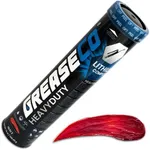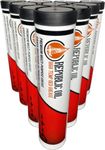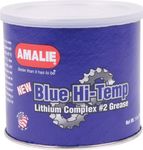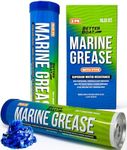Buying Guide for the Best High Temp Wheel Bearing Grease
Choosing the right high-temperature wheel bearing grease is crucial for ensuring the longevity and performance of your vehicle's wheel bearings. The right grease will protect against wear, corrosion, and extreme temperatures, ensuring smooth operation and reducing the need for frequent maintenance. When selecting a high-temp wheel bearing grease, consider the following key specifications to make an informed decision that best suits your needs.Temperature RangeThe temperature range indicates the minimum and maximum temperatures at which the grease can effectively operate. This is important because wheel bearings can get extremely hot, especially in high-performance or heavy-duty applications. Greases with a higher maximum temperature rating are suitable for more demanding conditions. For general use, a grease with a maximum temperature of around 300°F (150°C) may suffice, but for high-performance or heavy-duty applications, look for greases rated up to 500°F (260°C) or higher. Choose a grease with a temperature range that matches the operating conditions of your vehicle.
NLGI GradeThe National Lubricating Grease Institute (NLGI) grade indicates the consistency of the grease, which affects its ability to stay in place and provide lubrication. NLGI grades range from 000 (very fluid) to 6 (very hard). For wheel bearings, an NLGI grade of 2 is commonly recommended as it provides a good balance of staying in place while still being easy to apply. If you need a grease that can handle higher loads or more extreme conditions, you might consider a slightly higher grade, but for most applications, NLGI 2 is a reliable choice.
Base Oil ViscosityBase oil viscosity refers to the thickness of the oil used in the grease. This affects the grease's ability to flow and provide lubrication under different temperatures. Higher viscosity oils are better for high-temperature and high-load applications, while lower viscosity oils are suitable for lower temperatures and lighter loads. For wheel bearings, a medium to high viscosity base oil is typically preferred to ensure adequate lubrication under varying conditions. Consider the operating environment and load conditions of your vehicle when selecting the base oil viscosity.
AdditivesAdditives are chemical compounds added to the grease to enhance its performance. Common additives include anti-wear agents, corrosion inhibitors, and extreme pressure (EP) additives. These additives help protect the wheel bearings from wear, rust, and damage under high pressure. When choosing a grease, look for one with additives that match your specific needs. For example, if you frequently drive in wet or corrosive environments, a grease with strong corrosion inhibitors is essential. For heavy-duty or high-performance applications, EP additives are crucial to prevent wear under extreme conditions.
Water ResistanceWater resistance indicates the grease's ability to repel water and maintain its lubricating properties in wet conditions. This is important for wheel bearings, especially if you drive in rainy or snowy conditions, or if your vehicle is exposed to water frequently. Greases with high water resistance will prevent washout and protect the bearings from rust and corrosion. Look for greases labeled as water-resistant or waterproof if you expect to encounter wet conditions regularly.
CompatibilityCompatibility refers to how well the grease works with the materials and other lubricants used in your vehicle. Some greases may not be compatible with certain types of rubber seals or other greases, which can lead to degradation or reduced performance. Check the manufacturer's recommendations for compatibility with your vehicle's components and any existing lubricants. If you're unsure, it's best to stick with a grease that is known to be compatible with a wide range of materials and other greases.























